Managing taxes is key for your business’s success and following laws. But, it can seem hard with so many rules and forms. You might wonder which forms you must fill out. And how to do it right to avoid any trouble.
This guide will clear the confusion about business tax forms. Whether you’re running a small company or a big corporation, we will cover what forms you need. We’ll also talk about when they’re due. Plus, we’ll give tips to fill them out without mistakes.
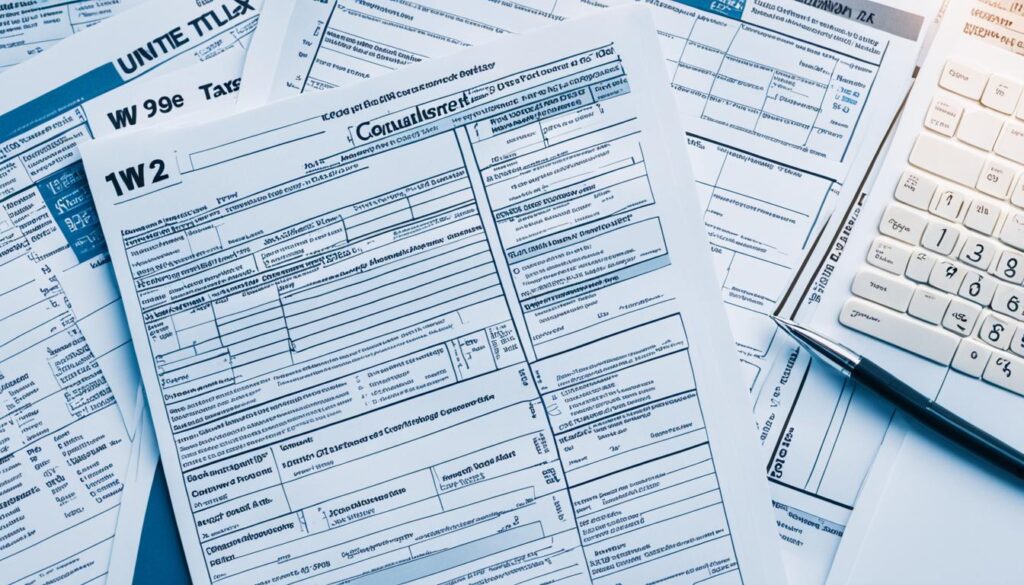
Key Takeaways:
- Understanding the essential tax forms for your business is vital for compliance and accurate tax filing.
- Small businesses, corporations, partnerships, and sole proprietorships have different tax form requirements.
- Filling out tax forms correctly and meeting deadlines can help you avoid penalties and fines.
- Consulting with a tax professional can provide guidance and support throughout the process.
- Maximize deductions and stay organized with proper record-keeping and tax planning.
Types of Tax Forms for Businesses
Filing taxes for your business requires knowing the different tax forms. These forms depend on your business’s structure and its tax duties. Let’s look at tax forms for various business types:
S-Corporations
S-Corporations, or S-Corps, are favored by small businesses. If you have an S-Corp, you need to file Form 1120S. This form reports the S-Corp’s income, deductions, and credits.
LLCs
Limited Liability Companies (LLCs) can choose how they’re taxed. Single-member LLCs are seen as sole proprietorships. Meanwhile, multi-member LLCs are viewed as partnerships. Sole proprietors use Schedule C to report income and expenses on personal returns.
C Corporations
C Corporations, also known as C Corps, face corporate income tax. C Corps must file Form 1120. This form details the C Corp’s income, deductions, and credits.
Besides these forms, businesses might need to file others. You may need forms for estimated taxes, self-employment taxes, and more. Knowing which forms fit your business helps with accurate tax reporting.
Here’s a table with different business tax forms:
| Business Entity Type | Tax Form |
|---|---|
| S-Corp | Form 1120S |
| LLC (Sole Proprietorship) | Schedule C |
| LLC (Partnership) | Form 1065 |
| C Corp | Form 1120 |
Knowing about business tax forms is key for correct filing and obeying tax laws. Always consult a tax expert or use IRS online resources to be sure. You want to file right and meet all tax needs.
Income Tax Forms
Income tax forms are key for sharing your business’s profit or loss and figuring out your taxes. The form you need depends on how your business is set up.
Sole Proprietorships, Partnerships, and LLCs
If you’re a sole proprietor, in a partnership, or have an LLC, you’ll use personal tax returns to report. You’ll likely use Form 1040 or 1040-SR. These let you report income and losses on your personal taxes.
Sole proprietors must also turn in Schedule C. It reports your business’s profit or loss. Schedule C helps make sure your business’s income is reported right.
“Filing the right income tax forms is vital for small businesses. Doing so correctly helps avoid penalties,” notes Sarah Johnson, a tax pro.
Partnerships
Partnerships file Form 1065 to share its financial activities. It includes income, gains, deductions, and losses. This helps report accurately to the IRS.
C Corporations
C corporations file using Form 1120. It’s for reporting income and deductions correctly, following IRS rules.
S Corporations and LLCs
S corporations and LLCs use Form 1120-S and Schedule K-1. These documents report income and deductions to shareholders correctly.
By knowing which tax forms to use, you can report correctly and meet tax duties.
Below is a table summarizing the tax forms for each type of business:
| Business Entity | Income Tax Form | Additional Form |
|---|---|---|
| Sole Proprietorships, Partnerships, LLCs (Individual Filers) | Form 1040 / Form 1040-SR | Schedule C |
| Partnerships | Form 1065 | N/A |
| C Corporations | Form 1120 | N/A |
| S Corporations, LLCs (S Corporations) | Form 1120-S | Schedule K-1 |
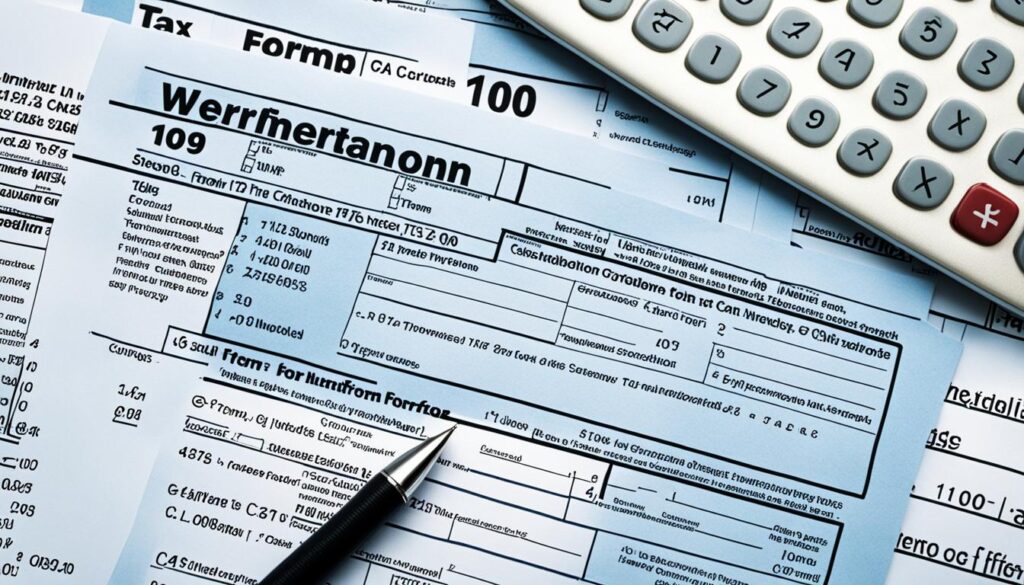
Other Important Tax Forms
Income tax forms are vital for showing your business’s profit or loss. But you may need to file other important tax forms too. These forms can help you get more deductions and follow IRS rules. Let’s look into some of these forms:
“Form 4562” lets you write off your business vehicles or property’s depreciation. Filling this form correctly can cut down your taxable income. This means you might pay less in taxes.
“Form 8829” is for sole proprietors who have a home office. It calculates your home office costs for tax deductions. Doing Form 8829 right can lower your taxable income, possibly giving you a bigger tax refund.
“Form 8283” is for non-cash charity gifts over $500. If your business gave such donations, do this form right to get tax deductions. This helps ensure you get the full tax benefits.
“Form 7004” is your way to ask for more time to file certain business tax returns. If you need more time for documents or to see a tax pro, submit Form 7004. It will give you extra time without penalty.
These forms are key to good tax planning and filing. Complete them truthfully and on time to avoid penalties. Talk to a tax expert or use tax software for help. They ensure your forms are right.
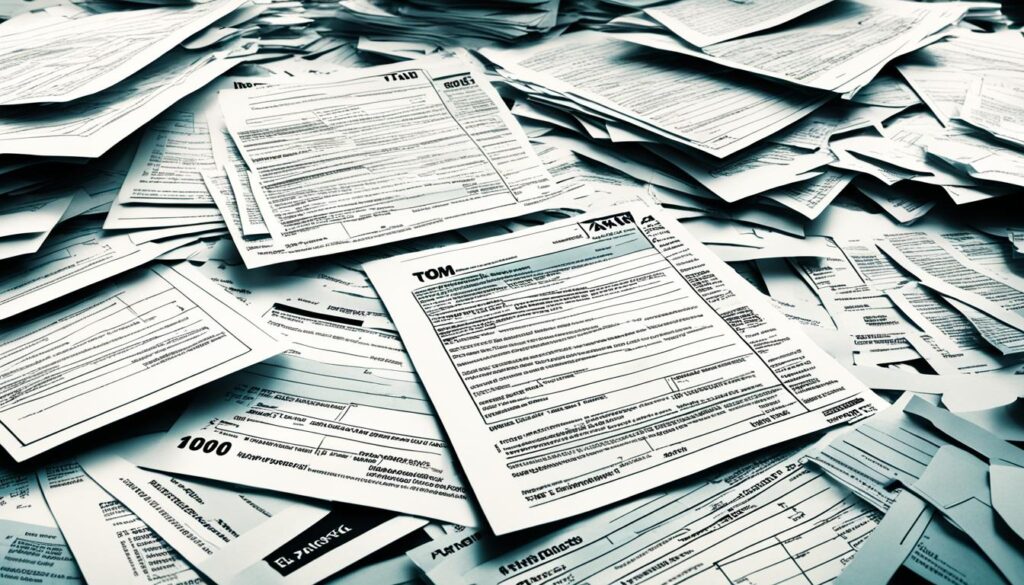
Keep reading for more on important tax forms. This includes forms for estimated taxes, self-employment taxes, employment taxes, excise taxes, and beginning a new business.
Forms for Estimated Taxes
If your business might owe $1,000 or more in taxes, paying estimated taxes is crucial. By sending payments every quarter, you avoid fines and keep your taxes correct. Here are the forms you need for estimated taxes:
Form 1040-ES
Sole proprietors, partners, and S corporation owners use Form 1040-ES for estimated taxes. This form figures out your tax for the year. It also shows how to pay your estimated taxes.
Form 1120-W
C corporations use Form 1120-W for their quarterly tax payments. This form calculates your tax using projected income and deductions.
Correct estimated tax payments help dodge IRS fines and keep your finances in order. Talking to a tax pro is wise. They assist in estimating your taxes and filling out forms correctly.

Self-Employment Tax Forms
If you’re a business owner working alone or in an S corporation, knowing your self-employment taxes is key. These taxes cover your contributions to Social Security and Medicare. You can figure out what you owe with Schedule SE, a form for calculating this tax.
For those owning a corporation or LLC taxed similarly to an S corporation, self-employment taxes are taken from their salary.
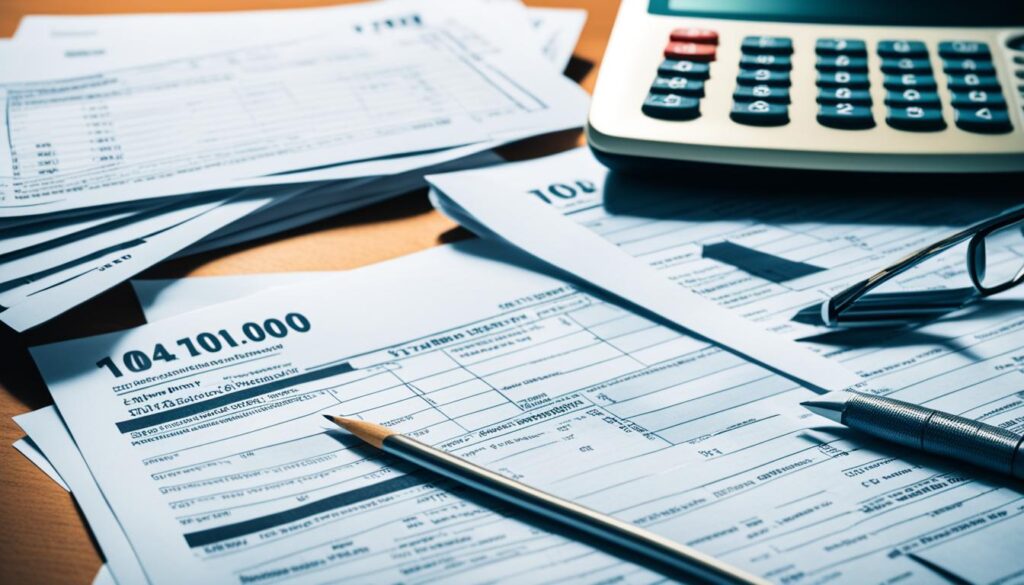
The Importance of Schedule SE
Schedule SE is crucial for properly reporting and figuring out your self-employment tax. It helps you work out how much you need for Social Security and Medicare, based on what you make. Filling out Schedule SE correctly helps you follow IRS rules and avoid fines.
Maximizing Deductions with Schedule SE
With Schedule SE, you do more than calculate what you owe. You can also deduct costs like health insurance, retirement savings, and other business expenses. Learning how Schedule SE works can help you reduce your tax bill.
Pro Tip: A tax pro can be a big help with self-employment tax forms. They ensure you’re doing things right, getting all deductions, and offer tailored advice.
| Form | Purpose |
|---|---|
| Schedule SE | Calculate self-employment taxes and claim deductions |
Filing Deadlines for Self-Employment Tax Forms
Knowing when to file self-employment tax forms is critical to avoid extra charges. Normally, forms like Schedule SE are due when individual tax returns are, typically April 15th. But, it’s important to check each year for changes due to weekends and holidays.
By getting familiar with self-employment taxes and filling out forms like Schedule SE on time, you keep in line with IRS rules and manage your taxes well.
Forms for Employment Taxes
Any business with employees needs to file employment tax forms, no matter the type of entity. These forms help you report and pay employment taxes to the IRS. Let’s look at the main employment tax forms you should know:
Form 941: Quarterly Federal Tax Return
Employers use Form 941 to report employee wages and taxes taken out, like federal income tax, Social Security tax, and Medicare tax. You must submit this form four times a year. It’s due by the last day of the month after the quarter ends. This form is key for calculating and paying employment taxes.
Form 943: Annual Federal Tax Return for Agricultural Employees
Form 943 is for employers with agricultural employees. It reports their wages and withheld taxes. Unlike Form 941, you file Form 943 once a year. It’s due by January 31st of the following year. If you have agricultural workers, you must file this form on time.
Form 940: Annual Federal Unemployment Tax Return
Form 940 reports and pays federal unemployment tax. This tax helps fund unemployment benefits. You file Form 940 once a year, by January 31st of the next year. Make sure to report your business’s unemployment tax accurately to avoid fines.
Form W-2: Wage and Tax Statement
Form W-2 sums up an employee’s yearly wages and taxes taken out. Employers must give Form W-2 to their employees by January 31st each year. It’s crucial to fill out this form correctly and give it to your employees on time.
Form W-3: Transmittal of Wage and Tax Statements
Form W-3 is used along with Form W-2. It sends copies of Form W-2 to the Social Security Administration (SSA). File Form W-3 annually, by the same deadline as Form W-2.
Form 1099-NEC: Nonemployee Compensation
Form 1099-NEC reports payments to nonemployees like freelancers or independent contractors. If you paid a nonemployee $600 or more, give them Form 1099-NEC by January 31st of the following year. You must also send a copy to the IRS.
Knowing these employment tax forms helps you meet IRS rules and avoid penalties. It’s important to fill out and file these forms on time. Tools like accounting software or tax professionals can make this easier. They help you manage your employment tax duties efficiently.
| Tax Form | Purpose | Filing Frequency | Deadline |
|---|---|---|---|
| Form 941 | Quarterly Federal Tax Return | Quarterly | Last day of the month following the end of each quarter |
| Form 943 | Annual Federal Tax Return for Agricultural Employees | Annually | January 31st of the following year |
| Form 940 | Annual Federal Unemployment Tax Return | Annually | January 31st of the following year |
| Form W-2 | Wage and Tax Statement | Annually | January 31st |
| Form W-3 | Transmittal of Wage and Tax Statements | Annually | Same as Form W-2 deadline |
| Form 1099-NEC | Nonemployee Compensation | Annually | January 31st of the following year |
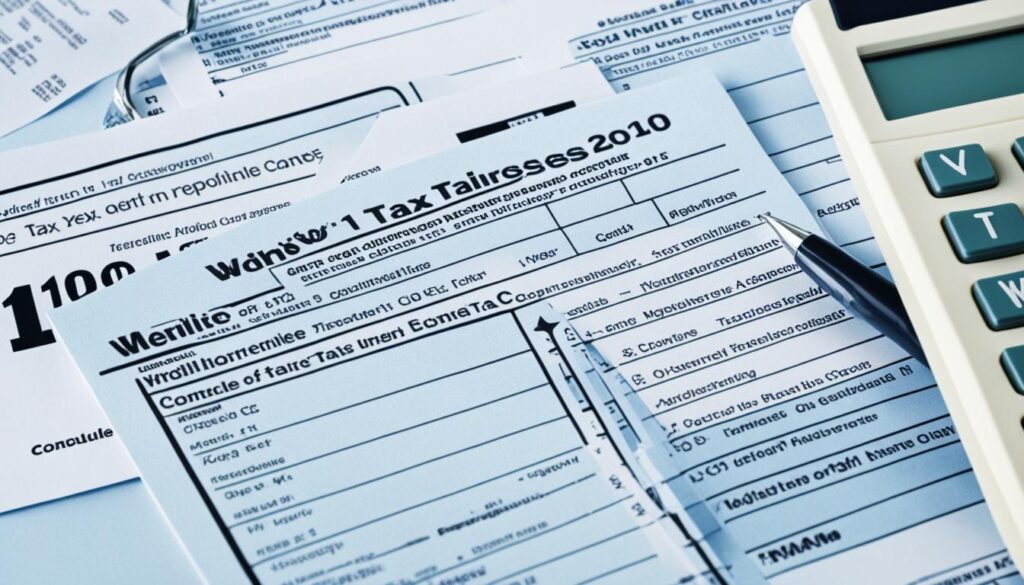
Excise Tax Forms
Understanding various taxes is crucial for running a business. One key tax is the excise tax, applied to certain goods, services, and activities. It’s essential to know how to report and pay these taxes.
To handle excise tax duties, businesses must file Form 720 quarterly. This form calculates the taxes owed on specific activities.
Form 720 includes taxes like environmental, communication, and air transportation taxes, as well as fuel taxes. Completing Form 720 accurately helps businesses meet their tax responsibilities and avoid penalties.

Key Points about Excise Tax Forms:
- Excise taxes are imposed on goods, services, and activities.
- Businesses are required to file Form 720, the quarterly federal excise tax return.
- Form 720 reports excise taxes owed on specific business activities, such as environmental taxes, communication and air transportation taxes, fuel taxes, and more.
- Accurate completion of Form 720 is essential to fulfill tax obligations and avoid penalties.
By learning about excise taxes and filling out Form 720 correctly, businesses can stay in line with IRS rules and ensure accurate tax reporting.
Starting a New Business: Form SS-4
When you start a new business, you’ll first need to handle Form SS-4. This form helps you get an Employer Identification Number (EIN) or business tax ID. Most businesses must have an EIN. You get this by filling out Form SS-4 and sending it to the IRS. It’s key for handling your business’s money and taxes.
Applying for an EIN: Form SS-4
Getting an EIN with Form SS-4 is simple. Here’s what to do:
- Obtain a copy of Form SS-4: Download it from the IRS site or call their helpline for a copy. Use the most recent form for accuracy.
- Provide accurate information: Fill in your business details accurately, like its name, address, and the responsible person’s information.
- Choose a filing method: You can apply online, by mail, or fax. Online is quickest, but mail or fax are options too. Check IRS instructions for addresses or fax numbers.
- Submit the form: Follow the form or IRS instructions to submit. If you file online, you’ll get your EIN right away. Mail or fax takes a few weeks.
- Keep a record: Once you’ve got your EIN, store it safely. You’ll need it for business tasks like opening a bank account, filing taxes, and hiring.
Using Your EIN
Your EIN is a unique identifier for your business. It’s important for the IRS to track your taxes and filings. Here’s how you’ll use it:
- Tax filings: Include it in tax forms to identify your business correctly.
- Opening a bank account: Banks ask for an EIN to open business accounts. This keeps business and personal money separate.
- Hiring employees: You need it for employment taxes, W-2 forms, and payroll.
- Applying for permits and licenses: Local governments may need an EIN for business permits and licenses. It confirms your business is legal.
By getting an EIN with Form SS-4, your business is set for taxes. This number makes managing finances and following IRS rules easier.
“Getting an EIN with Form SS-4 is crucial for new businesses. It legally identifies your company and makes taxes easier. Always keep track of your EIN.”
With knowledge of Form SS-4 and EIN importance, you’re set for a new business. For more advice, talk to a tax expert about your business and taxes.
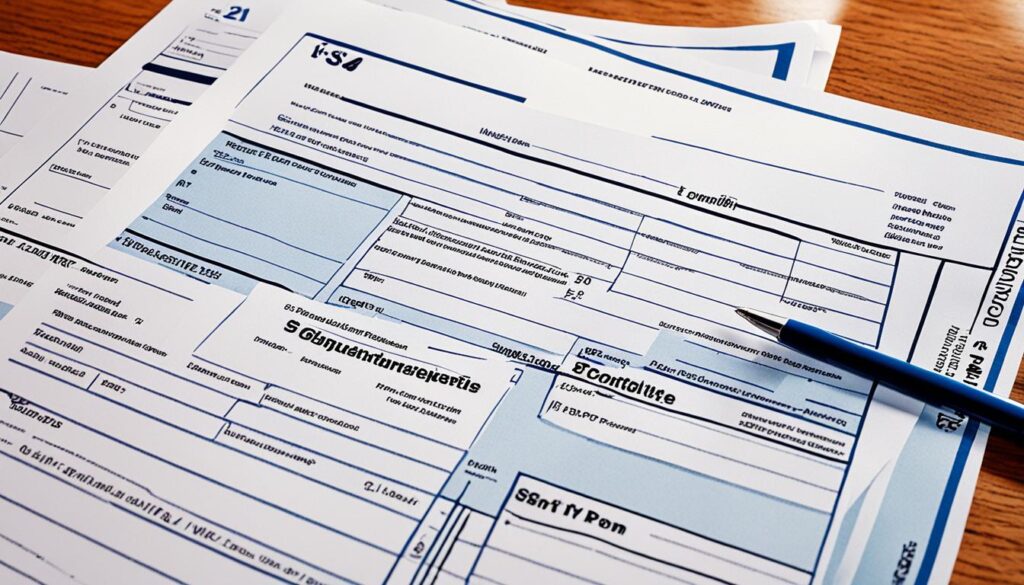
Conclusion
It’s key to understand and correctly fill out the needed business tax forms. This helps you meet your tax obligations and avoid fines. Know the specific forms for your type of business and tax duties. This way, you can deal with IRS challenges and ensure accurate tax filing.
Getting help from a tax pro can give you crucial advice and support. Stay organized and meet deadlines. Use resources to make tax filing easier for your small business.
FAQ
What are the essential business tax forms and how do I fill them out?
Are there any other important tax forms I need to know about?
How do I calculate and pay estimated taxes?
FAQ
What are the essential business tax forms and how do I fill them out?
The essential business tax forms change based on your business type. Sole proprietorships and partnerships file using Form 1040 or 1040-SR. C corporations must use Form 1120. Sole proprietors file Schedule C.
Partnerships need Form 1065. S corporations and some LLCs should use Form 1120-S and Schedule K-1. Each form includes detailed filling out instructions.
Are there any other important tax forms I need to know about?
Yes, other key tax forms exist. Use Form 4562 for deductions like depreciation. Form 8829 is for home office expenses. For non-cash charity gifts over 0, file Form 8283.
Businesses can request an extension with Form 7004.
How do I calculate and pay estimated taxes?
If you owe
FAQ
What are the essential business tax forms and how do I fill them out?
The essential business tax forms change based on your business type. Sole proprietorships and partnerships file using Form 1040 or 1040-SR. C corporations must use Form 1120. Sole proprietors file Schedule C.
Partnerships need Form 1065. S corporations and some LLCs should use Form 1120-S and Schedule K-1. Each form includes detailed filling out instructions.
Are there any other important tax forms I need to know about?
Yes, other key tax forms exist. Use Form 4562 for deductions like depreciation. Form 8829 is for home office expenses. For non-cash charity gifts over $500, file Form 8283.
Businesses can request an extension with Form 7004.
How do I calculate and pay estimated taxes?
If you owe $1,000 or more in taxes, make quarterly payments. Sole proprietors, partners, and S corporation shareholders use Form 1040-ES. C corporations file Form 1120-W.
These forms help calculate and submit estimated tax payments.
What tax forms do I need for self-employment taxes?
For sole proprietors and S corporation members, pay self-employment tax on earnings. Use Schedule SE for calculating what you owe.
What tax forms are required for employment taxes?
Businesses with employees must handle employment tax forms. File quarterly taxes with Form 941. Use Form 943 for agricultural employees.
Form 940 is for federal unemployment tax returns. Give W-2 forms to employees and a W-3 to the Social Security Administration. Use Form 1099-NEC for freelancers and independent contractors.
Are there specific tax forms for excise taxes?
Yes, for excise taxes file Form 720, the quarterly return. It covers excise taxes on activities like air transportation and fuel.
What is Form SS-4 used for?
Form SS-4 applies for an Employer Identification Number (EIN), or a business tax ID. An EIN helps in managing business finances and tax duties.
,000 or more in taxes, make quarterly payments. Sole proprietors, partners, and S corporation shareholders use Form 1040-ES. C corporations file Form 1120-W.
These forms help calculate and submit estimated tax payments.
What tax forms do I need for self-employment taxes?
For sole proprietors and S corporation members, pay self-employment tax on earnings. Use Schedule SE for calculating what you owe.
What tax forms are required for employment taxes?
Businesses with employees must handle employment tax forms. File quarterly taxes with Form 941. Use Form 943 for agricultural employees.
Form 940 is for federal unemployment tax returns. Give W-2 forms to employees and a W-3 to the Social Security Administration. Use Form 1099-NEC for freelancers and independent contractors.
Are there specific tax forms for excise taxes?
Yes, for excise taxes file Form 720, the quarterly return. It covers excise taxes on activities like air transportation and fuel.
What is Form SS-4 used for?
Form SS-4 applies for an Employer Identification Number (EIN), or a business tax ID. An EIN helps in managing business finances and tax duties.